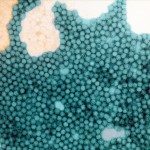Link to Pubmed [PMID] – 18329732
J. Virol. Methods 2008 May;149(2):277-84
Human enteroviruses are among the most common viruses infecting humans and can cause diverse clinical syndromes ranging from minor febrile illness to severe and potentially fatal diseases. Biodiversity and evolution of human enterovirus genomes are shaped by frequent recombination events. Therefore, identification and characterization of circulating strains of enteroviruses require partial determination of different genomic regions. The development is described of a simple method allowing amplification and partial sequencing of the P1, P2 and P3 genomic regions of field human enterovirus strains isolated in cell cultures, by performing PCR on cDNAs generated through a single RT reaction. A set of generic primers were designed and tested on a panel of 90 field and prototype viruses belonging to the five species of human enteroviruses. This assay was shown to amplify efficiently the targeted regions of all the 90 genomes tested. The generated amplicons were sequenced successfully without the need for gel purification. This assay could be a valuable tool for laboratories interested in molecular epidemiology and evolution studies implicating a great number of human enterovirus strains isolated from human or environmental samples.





